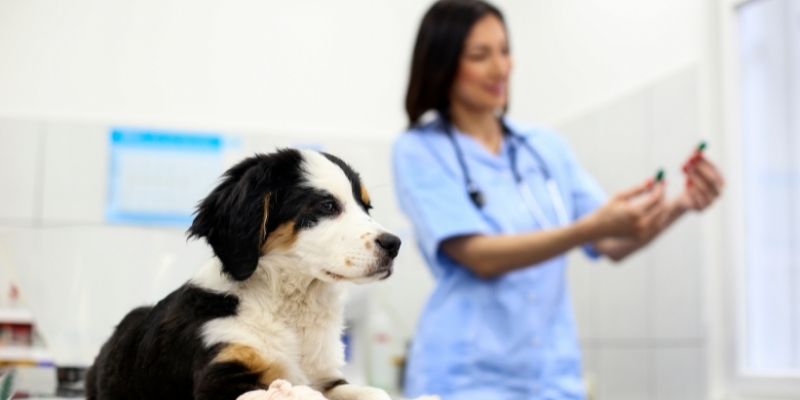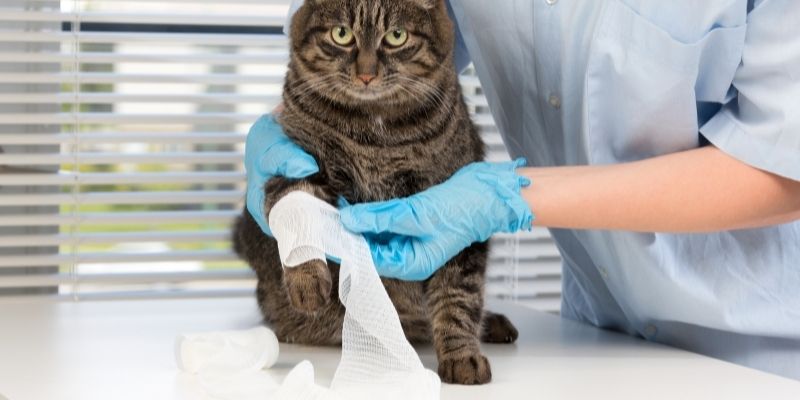A Day in the Life of a Veterinary Receptionist
When we think of veterinary careers, it’s easy to immediately think of the Veterinary Surgeons and Vet Nurses who save animal lives by performing surgeries and administering critical treatments. What about the glue that holds the entire veterinary practice together? The clinic would be in chaos if it weren’t for the multi-tasking skills of Veterinary Receptionists.While not the one wielding the scalpel or fitting the dreaded cone of shame on animals recovering from surgery, Veterinary Receptionists keep the practice running like a well-oiled machine. If you’re wondering ‘What does a Veterinary Receptionist do?’, find out more through our look at a day in the life of these crucial members of the veterinary team.
Return Voicemails and Answer Emails
Any Veterinary Clinic Receptionist will start their day by checking emails or voicemails left at the practice. Messages can be left overnight or early in the morning from distressed pet owners who need assistance, or those with existing appointments looking to cancel or postpone them.Checking any messages and emails received, and responding to them, is essential as cancellations and delays can be detrimental to the day's schedule and cost the clinic money.
Set Up the Reception Area
The next set of Veterinary Receptionist duties is to make sure your station is set up with all the information you need ahead of your day. If you’re wondering how to be a good Veterinary Receptionist, one of the best tips is to be as prepared for the expected as possible. 
In this instance, do some forward planning and compile information on the expected clients for the day, so you know who is coming in and what for. Also, establish if this is a follow up for an existing situation or something entirely new. Being well-informed when you greet animals and their owners is the best way to impress and avoid any issues or miscommunications.
It’s also very handy when you have to juggle the schedules of multiple Vets and other veterinary professionals, so you don’t get confused as to who is arriving to see who. After you have all the documents you need, check over the veterinary reception itself and the waiting area to make sure it’s clean, tidy and ready for patients to arrive.
Open the Practice
Once you’re satisfied the veterinary practice is organised and ready to go, you can open the doors. This is when the fun starts to happen and your multitasking skills really get put to the test! Be prepared for patients to start walking through the doors - expected and otherwise - and for the phone to start ringing. Don’t forget that you need to make every patient feel important as they are all valuable to your practice!
Welcome Animal Patients
With the doors now open, any pet lover in this role can indulge their adoration for animals as they greet each one and its owner as they arrive for their appointment. Now, these Veterinary Receptionist scenarios require you to be able to read the room and cater your approach to each situation. Pets and other animals will visit the veterinary practice for any number of reasons. Some are hurt and require you to approach with caution, some will be scared so you will need to be gentle and calm, others may just be happy to be out in which case you can pet them to your heart’s desire!
In a similar vein, you will need to communicate with the owner accordingly too, comforting them where needed or sharing in their excitement if they’ve brought their new puppy in for its first visit.
Once you have welcomed them in, it’s time to get the necessary information you need to proceed. This could be:
- Confirmation they have fasted for at least 12 hours before surgery
- Take accurate weight measurements
- Have the owner sign any necessary documentation

Take Phone Calls
In amongst the meeting and greeting, smiling and belly rubs, you’ll need to be aware of the phone ringing and answer within good time. Anyone could be on the other end of the call in any number of situations. Receptionist jobs at veterinary clinics require you to juggle phone conversations with those you have with animal owners face-to-face and make sure each person feels they have been listened to. Sometimes, this will require you to put the person on the phone on hold while you wrap up a conversation with an animal’s owners at the practice. First, you must check the person on the phone doesn’t have an emergency, then if they are happy to do so, place them on hold momentarily.
The role of a Veterinary Receptionist is to give all your attention to the client directly in front of you. As it is to give your full attention to the person on the phone. Juggling these interactions effectively is essential for patient satisfaction and retention.
You also need to be highly knowledgeable about an array of animal issues to be able to advise and screen calls effectively. As a Veterinary Receptionist, you will speak to people about all manner of situations and animal behaviours. As the reception is where people will get their first impression of the veterinary practice, you need to make a good one! Being knowledgeable is also essential so you can explain what is best for the pet and book an appointment accordingly if necessary.
Manage Walk-ins and Emergency Patients
Along with the phones and anticipated patients, you will likely have walk-in patients to see as well. In many cases, this is just to collect a food order or prescription of medication for their animals. In other instances, it could be someone popping in to ask for a bit of advice. In any case, as a Veterinary Receptionist, you need to anticipate their needs and make sure they leave satisfied with your service. One of the more challenging situations you will face in Veterinary Receptionist jobs is the handling of unexpected emergency patients. Whether they are on the phone or arrive at the clinic looking for help, you will need to use your triage skills to recognise a genuine emergency and prioritise the patient with the most severe needs.
One of the most important Veterinary Receptionist skills is effective communication, which will be tested heavily in times like these. You must obtain important information and the necessary details from panicked owners and relay that information clearly to the required members of the veterinary team.
This is also another example of the importance of scheduling, as when walk-in and emergency patients arise, you have a clear picture of appointments that are free or newly available that you can fill to keep the practice running smoothly and profitability.
.jpg)
Advise Animal Owners About Helpful Products
You will often find that animal owners visiting the practice spend some time looking at the products on offer or advertised services like grooming that are available within the practice. Aside from providing the perfect opportunity to generate some extra income for the practice, assisting owners with purchases is also an excellent way to make sure the pet or animal is getting the best solution to their needs.
As such, you will need to have knowledge of:
- Pet food and nutrition
- Parasite control
- Products that aid animal health
Round off Patient Visits
Once animal patients have been in for their treatment or consultation, they will come your way once again to tie up any loose ends in terms of paperwork, payment or the booking of follow up appointments. What you must remember is that visiting the vet can often be a stressful experience, with a lot of information to take in. Veterinary Receptionist responsibilities extend to checking in with each visitor as they leave to ask how their appointment was and if they have any questions.
By taking the time to complete this follow up exit process, no one will leave the practice uncertain or confused, which can save patient aggravation and issues down the line. It’s always best to advise when they can expect to hear from the team at the practice again to manage their expectations too.
Complete Admin Duties
After each appointment, the latest updates on the patient’s condition, treatment or situation must be recorded for future reference. As a Veterinary Receptionist, you can also be tasked with: - Sending reports to specialists
- Calling animal patient owners to follow up after appointments if you couldn’t when they were at the practice
- Prepare prescriptions
- Contact other veterinary clinics for a patient’s history
- Walk owners through a new treatment plan for their pet, and more

Working as a Veterinary Receptionist is anything but a desk job, it’s engaging, fascinating and rewarding as you see your knowledge, organisation and personable skills make a huge difference in the lives of those seeking the best support for their beloved animals.
Start a Career as a Veterinary Receptionist
If you want an active, stimulating and sociable career that enables you to indulge a love of animals, you should consider being a Veterinary Receptionist. Above all, it’s a career path that speaks to those who aspire to continue learning to develop their skills. There is no end to the education you will receive in this role, as your Veterinary Receptionist training checklist is never complete. There’s always something you can learn to better help those at the front desk.
Just a few examples of the knowledge you need include:
- What is considered an emergency?
- What can wait to be seen?
- What are the side effects of different medications?
- What is the clinic's vaccine protocol?
- What will blood tests or urine tests tell the owner?
- What are various animal diseases and how does the clinic diagnose and treat them?

Study Veterinary Receptionist Courses Online
If you’re looking for the quickest and most convenient way of gaining recognised Veterinary Receptionist qualifications, Animal Course Direct have an Ofqual regulated online Level 3 Veterinary Receptionist Certificate that is ideal for you. As an online course, you can study from home at a time and place that suits you. Being focussed entirely on this role, you will also learn exactly what makes a good Veterinary Receptionist, so you will have the knowledge and skills that outshine others vying for roles.
The course centres around 5 key units, which include:
- Principles of Customer Service and Communication in a Veterinary
- Principles of Managing a Veterinary Reception Area
- Understanding a Range of Veterinary Products
- Understanding of Administrative Support in a Veterinary Practice
- Understanding Veterinary Terminology and Clinical Procedures
Also, if you adore animals, you can keep track of all upcoming animal awareness days and events with our FREE calendar! Download it here.
(2).jpg)
















